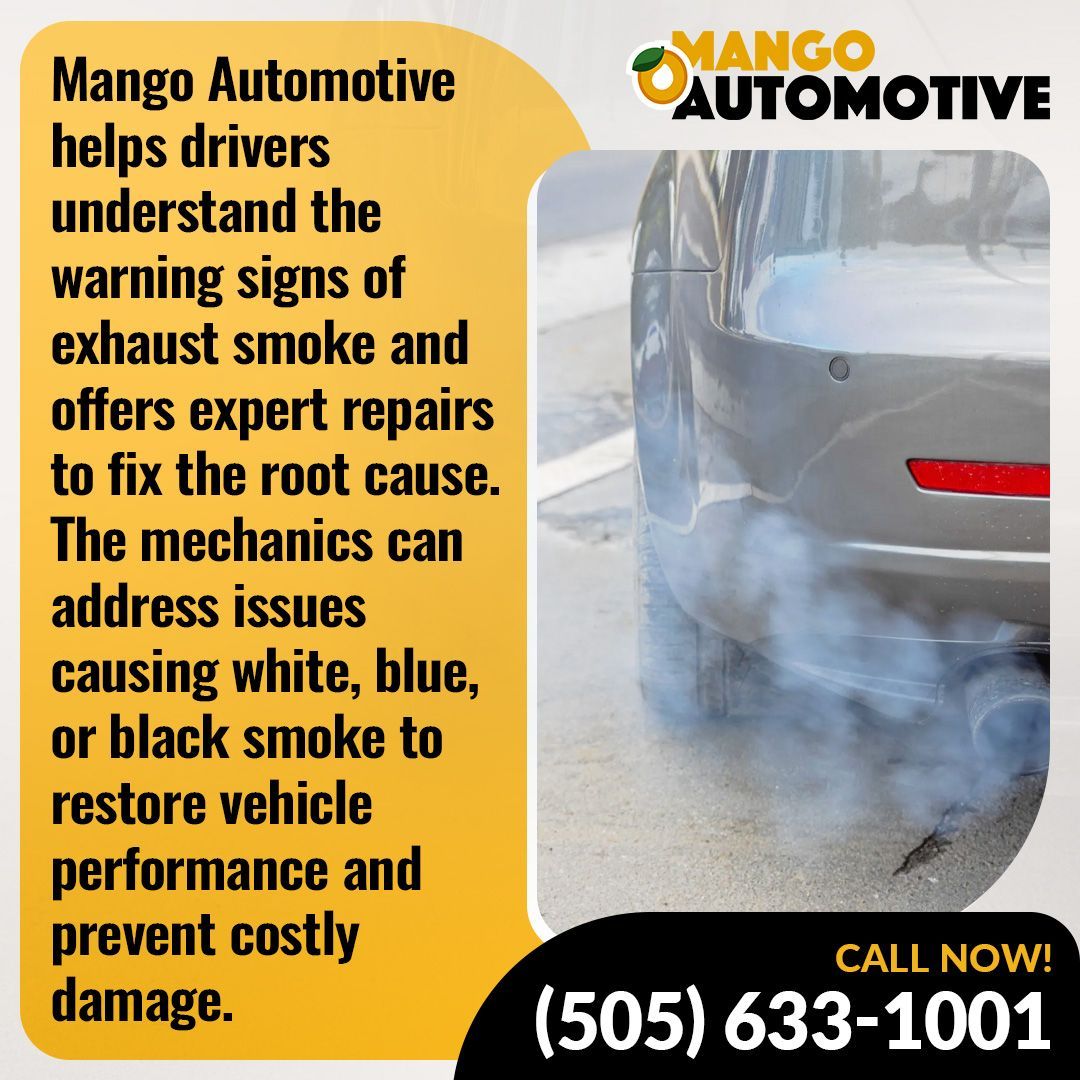Is Car Exhaust Smoke Normal? Mechanic in Eagle Ranch Explains
Exhaust smoke from gasoline engines isn't always a reason to panic, but understanding what different colors mean can save you from costly repairs. Light white vapor on cold mornings is typically normal condensation, while thick white, blue, or black smoke indicates engine problems requiring immediate attention from a qualified mechanic. The key factors are smoke color, thickness, when it appears, and whether it dissipates quickly or lingers.
At
Mango Automotive, our experienced
auto mechanics in Albuquerque have diagnosed thousands of gasoline engine problems, from simple condensation concerns to complex head gasket failures. Modern gasoline engines with properly functioning emission control systems should produce virtually invisible exhaust emissions under normal driving conditions. When visible smoke appears consistently, it signals that something within your engine's combustion or cooling systems needs professional attention from skilled mechanics.

White Smoke From Engine Exhaust
White smoke from your gasoline car's exhaust tells different stories depending on several key factors. Thin, wispy white smoke that appears when you first start your car on a cold morning is usually just water vapor from condensation buildup in the exhaust system. This type of white smoke should disappear within a few minutes as your engine warms up and is completely normal for gasoline engines.
However, thick white smoke that continues after your gasoline engine reaches operating temperature signals a more serious problem. This typically indicates that coolant is leaking into the combustion chamber. It can happen due to a blown
head gasket, cracked cylinder head, or damaged engine block. The smoke may have a sweet smell and could be accompanied by overheating issues.
Warning Signs Requiring Immediate Attention
Several warning signs indicate that white exhaust smoke requires immediate attention from a qualified auto mechanic in Albuquerque, like Mango Automotive. These include:
Thick, billowing white smoke that doesn't dissipate- Sweet smell accompanying the smoke
- Engine overheating or running hot
- Foam or white residue in the engine oil
- Rapid coolant loss without visible external leaks
Continuing to drive with a coolant leak can cause catastrophic engine damage that costs thousands more than early repair intervention. At Mango Automotive's Eagle Ranch location, we use advanced diagnostic equipment to quickly identify coolant system problems and prevent costly engine damage.
Blue Smoke
Blue or gray smoke from the exhaust is a clear sign that your gasoline engine is burning oil. This happens when worn valve seals, damaged piston rings, or cylinder wall wear cause engine oil to leak into the combustion chamber. While not immediately dangerous to drive short distances, blue smoke represents an ongoing problem that worsens over time in gasoline engines.
Identifying Blue Smoke Patterns
Blue exhaust smoke creates several cascading problems in gasoline engines:
Increased oil consumption requiring frequent top-offs- Fouled spark plugs leading to misfires
- Catalytic converter damage from oil contamination
- Failed emissions tests
- Progressive engine wear and reduced performance
Normal gasoline engines should consume less than 1 quart of oil per 1,000 miles - blue exhaust smoke often indicates consumption rates 3-10 times higher than normal
The timing of blue smoke appearance helps pinpoint the cause in gasoline engines. If you see blue smoke when accelerating, worn piston rings are likely the culprit. Blue smoke during deceleration typically points to valve guide or valve seal issues. Modern gasoline engines should not produce visible blue smoke under normal operating conditions.
Older gasoline vehicles or those with high mileage commonly experience blue smoke issues. A qualified mechanic can perform tests to identify the exact source of oil burning and recommend appropriate repairs for your gasoline engine. Our mechanics in Eagle Ranch diagnose oil consumption issues and provide cost-effective solutions that restore your engine's performance.
Black Exhaust Smoke
Black exhaust smoke from gasoline engines indicates your engine is burning too much fuel relative to the available air. This rich fuel mixture condition reduces fuel economy, increases emissions, and can damage engine components over time. While less immediately threatening than coolant or oil burning, black smoke requires prompt diagnosis and repair.
Common Causes and Symptoms
Common causes of black exhaust smoke in gasoline engines include clogged air filters, malfunctioning fuel injectors, faulty oxygen sensors, or intake manifold problems. Modern gasoline engines with properly functioning emission control systems should prevent visible black smoke under normal driving conditions.
Black smoke symptoms often accompany gasoline engine problems such as poor fuel economy, rough idle or stalling, strong fuel odor, check engine light activation, reduced engine performance, and fouled spark plugs with carbon buildup.
If your gasoline engine consistently produces black smoke, schedule diagnostic testing to identify and resolve the underlying fuel system issues affecting your gasoline engine's performance. At Mango Automotive, our diagnostic team uses modern fuel system analyzers to pinpoint exactly why your engine is running rich and provide targeted solutions.
What to Do When You See Exhaust Smoke
Your response to exhaust smoke should depend on the color and intensity you observe. If it is:
Light white vapor: Safe to drive normally- Thick white smoke: Stop driving immediately and seek professional help
- Blue smoke: Limit driving and schedule immediate service
- Black smoke: Reduce driving and avoid heavy acceleration until repaired
- Any smoke with strange odors: Pull over safely and shut off your gasoline engine
When in doubt, contact a reliable mechanic for guidance. Many auto repair facilities, including Mango Automotive, offer phone consultations to help determine whether immediate towing is necessary or if you can safely drive to their location for diagnosis.
Diagnostic Patterns and Timing
The timing of exhaust smoke appearance provides valuable diagnostic clues for identifying underlying problems in gasoline engines. Cold morning startups reveal different issues than smoke appearing during afternoon driving or highway operation.
Morning Startup Patterns
Different types of exhaust smoke during engine startup can indicate specific gasoline engine problems:
Light white vapor: Normal condensation, especially in cold weather- Blue puffs during first few minutes: Valve seal issues allowing overnight oil seepage
- Immediate thick white smoke: Possible coolant system problems
- Black smoke from cold start: Fuel system richness issues
Driving Condition Patterns
Smoke that appears while driving your gasoline engine reveals different underlying issues:
Blue smoke during acceleration: Usually indicates piston ring problems- Blue smoke during deceleration: Valve guide or seal issues
- Black smoke under load: Suggests fuel system or air intake problems
- White smoke after the engine warms up: Indicates serious cooling system failure
Environmental factors affecting gasoline engine exhaust smoke include temperature and humidity levels, altitude and air pressure changes, seasonal fuel blend variations, and engine load and driving style. Our
mechanics in Albuquerque consider all these timing factors when diagnosing exhaust smoke issues in gasoline engines.
Comprehensive Services at Mango Automotive
At Mango Automotive, we offer a complete range of automotive services to address all your gasoline engine needs. Our service offerings include everything from routine maintenance to major gasoline engine repairs.
Advanced Engine Diagnostics
Our advanced capabilities include engine analysis using computerized diagnostic equipment. Our mechanics in Eagle Ranch perform thorough inspections of your gasoline engine's combustion system, fuel delivery components, ignition system, and emission control devices.
Our diagnostic process identifies root causes of exhaust smoke problems quickly and accurately, saving you time and money on unnecessary repairs. We understand that exhaust smoke problems can be stressful, which is why we prioritize fast, reliable service that gets to the root cause quickly.
Exhaust System Services
At Mango Automotive, our exhaust system services include inspection, repair, and replacement of all exhaust components. We service catalytic converters, oxygen sensors, exhaust manifolds, mufflers, and exhaust pipes. Our auto mechanics in Albuquerque are experienced in diagnosing complex exhaust smoke issues and providing lasting solutions that restore your gasoline engine's efficiency.
Since cooling system problems often cause white exhaust smoke, we provide cooling system services that include radiator repairs, thermostat replacement, water pump service, and coolant system flushes. Our cooling system expertise helps prevent the head gasket failures and engine damage that create costly white smoke problems.
Engine System Repairs
Blue smoke issues require expertise in engine lubrication systems. We provide complete oil system services, including valve seal replacement, piston ring diagnosis and repair, PCV system service, and oil consumption troubleshooting. Oil system knowledge of our mechanics in Albuquerque helps resolve blue smoke problems while extending your gasoline engine's lifespan.
Black smoke problems often stem from fuel system issues. Our fuel system services include fuel injector cleaning, air filter replacement, mass airflow sensor service, and fuel pressure testing. We use professional-grade equipment to restore proper fuel delivery and eliminate rich-running conditions that cause black exhaust smoke.
Why Choose Our Expert Team of Mechanics in Albuquerque
We bring specialized expertise in gasoline engine diagnostics and offer transparent pricing with detailed explanations. Our expert mechanics in Eagle Ranch are trained on domestic and foreign gasoline vehicles, providing solutions for all makes and models.
We take pride in our diligent approach to gasoline engine service. Our advanced diagnostic tools help us identify exhaust smoke causes accurately, whether it's a simple PCV valve replacement or a complex head gasket repair. We explain every step of the process, empowering you to make informed decisions about your gasoline engine's care.
Prevention Strategies
Regular maintenance is the most effective way to prevent exhaust smoke issues in gasoline engines. Following manufacturer-recommended service intervals helps identify potential problems before they cause visible smoke emissions.
Key maintenance practices for gasoline engines include regular oil changes using correct viscosity oil, air filter replacement according to schedule, cooling system flushes and inspections, PCV system cleaning and valve replacement, fuel injector cleaning services, and oxygen sensor replacement when indicated. Professional inspections by an auto mechanic near you can detect early signs of wear in gasoline engine components before they cause exhaust smoke.
Warning signs to monitor in gasoline engines include a gradual increase in oil consumption, changes in engine idle quality, reduced fuel economy, check engine light activation, and unusual odors from exhaust. Staying proactive with gasoline engine maintenance saves money and prevents inconvenient breakdowns.
Get Professional Exhaust Analysis in Albuquerque
Exhaust smoke problems in gasoline engines rarely resolve themselves and typically worsen over time, leading to more expensive repairs. What starts as minor oil seepage can progress to complete engine failure if left unaddressed. Similarly, small coolant leaks can cause catastrophic overheating damage in gasoline engines.
At Mango Automotive, our skilled team of auto mechanics in Albuquerque provides expert gasoline engine diagnostics and exhaust system repairs. Our advanced diagnostic equipment and experienced technicians ensure accurate problem identification for all makes and models of gasoline engines.
Don't let exhaust smoke problems compromise your vehicle's performance and safety. Call Mango Automotive at
(505) 633-1001 to schedule your gasoline engine exhaust system inspection today. Our expert mechanics in Eagle Ranch provide fast, reliable diagnosis and repair services that get to the root cause of gasoline engine exhaust issues.












